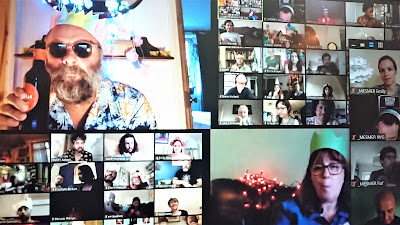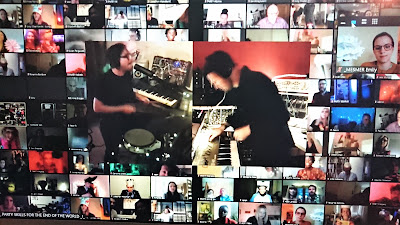The other week, I managed to get a ticket for a reimagined version of Manchester International Theatre's immersive show. Tickets were free but numbers were limited due to the limitations of Zoom video call software. I was intrigued by how an immersive/participatory concept would translate to streaming from home.
There were two performances each with an audience of 150 people. The hosts (performers and theatre-makers Nigel Barrett and Louise Mari) welcomed us with drinks and party hats, trying to create an informal and celebratory atmosphere.
The show, which was performed in a warehouse venue for MIF in 2017, strikes a strange balance between a convivial gathering (virtually due to social distancing restrictions), and undercurrents of apocalyptic nihilism. These opposing elements could have been more interweaved, to make a less disjointed viewing experience - drinking shots together one minute, then listening to the cast talk about basic survival facts like which will plants will poison you. This being said, of the live virtual theatre I have watched since our British version of 'lockdown' began, it is by far the most visually interesting and cleverly crafted experience.
Through the Looking Glass
My main comparison is to Secret Cinema's movie nights Secret Sofa, where actors and audience interact on Zoom in characters and dress inspired by the chosen cinematic world. I tuned in to Moulin Rouge and was left on mute and slightly bemused watching audience members dance (enthusiasm level seemingly related to their alcohol intake) whilst actors dressed as Bohemians and the Green Fairy encouraged us to love and be free.
The revolutionary and social mood was slightly hampered by everyone being stuck at home and separate, and there was not much substance to the performance beyond short monologues and a few participants given the spotlight for a remote talent show, although the theme is obviously anarchic by nature and it was nevertheless enjoyable. The guest performers were hours into proceedings, and I'm afraid to say I did not last long enough to see many of the variety acts which sounded promising.
I previously reviewed a two-hander play performed on Zoom, using virtual backgrounds and speaker view.
Theatre meets webinar
What were the party skills we learned to prepare for the end times? Like many immersive shows, the audience had differing experiences. Obviously, if you have 150 people unmuted, actual interaction is impossible. We were randomly chosen and sent to breakout rooms with about 8 participants, the same group experiencing the different skill rooms each time which allowed for some familiarity to develop.
The host encouraged us to unmute ourselves on entering the rooms, then instructed us in their activity. Annoyingly, until you switch to gallery view from speaker view which is Zoom's default, this resulted in trying to watch the host show us how to make paper flowers whilst the screen kept switching to whichever audience member laughed or commented loudly.
I particularly enjoyed the fight instructor coaching us through some basic punches and stances. This seemed genuinely useful for a survival scenario. The other skill was an actress showing us how to trim our own hair, which certainly is helpful for many in lockdown, but was irrelevant to me as I have already been doing DIY haircuts and it was geared towards long hair.
Coming together - virtually
Once I tried to contribute to the chat and was overridden by a louder participant. Zoom software favours the loudest and as someone with naturally shy tendencies, I preferred the main room to the breakout rooms, not enjoying the unnatural experience of observing yourself in a virtual social situation!However, in the main space the visual potential of Zoom was taken beyond the inbuilt limitations of the software by Mesmer who managed the broadcast. As you will see from my snapshots, they played with a hybrid of speaker and gallery view, so the performers were prominent but many audience feeds were always visible.
After a dark nihilist monologue about fear and chaos, followed by a segment that seemed to consist of some tipsy women in their kitchen, the performance culminated in a musical performance from an electronic dance duo AK/DK. As the screen scrolled through the people watching and dancing in their houses, and the music thrummed intensely, I finally had the sense of a communal experience and forgot my misgivings.
I felt a connection to the others experiencing this strange assembly in a digital space. There was a sense of revelry and loss of inhibition as I saw the audience enjoying themselves and reacting to the music, forgetting to be self-conscious in our patchwork of windows. In the brave new world of live-streamed theatre, this was a transcendent moment.

